If you’ve ever used a fintech app to see all your bank accounts in one place or made a quick “Pay by Bank” payment without typing in card details, you’ve already experienced the quiet power of a Third-Party Provider (TPP).
These are the regulated companies that sit behind modern Open Banking, connecting your app or business system directly to the banks, with full consent and complete security. They’re the invisible infrastructure turning complex financial data and payments into something almost effortless.
But while the concept of TPPs is now familiar, the real question is:
Which companies are actually making Open Banking work at scale and how?
Most articles stop at explaining what a TPP is. Few take you behind the scenes to show what success looks like in practice, which platforms are driving measurable results, and what they’re doing differently.
In this blog, we’ll explore five real-world examples of successful TPPs in the UK, including how they’ve reshaped everything from payments to data aggregation. You’ll see the strategies, compliance standards, and business models that make them stand out and why firms across accounting, law, lending, and fintech are now partnering with Open banking Third party providers
Understanding Third-Party Providers in Open Banking
Before diving into real success stories, let’s take a step back to understand the role these providers play in the Open Banking ecosystem and why they’ve become essential for modern financial operations in the UK.
What Do They Actually Do?
At their core, these regulated companies act as secure connectors between banks and the digital tools people use every day.
When your accounting platform fetches live bank transactions or a client pays you directly through their banking app, that connection is made possible by an authorised provider working quietly in the background.
Their job is simple but powerful:
- Fetch account data (with customer consent) to power insights, verification, or reconciliation.
- Initiate instant payments directly from bank accounts without needing cards or manual processing.
Two Main Service Categories
Every authorised provider typically operates in one or both of these areas:
1. Account Information Services (AIS)
These solutions pull live account data — balances, transactions, and statements to enable financial analysis, cash-flow forecasting, and compliance checks.
They’re widely used in sectors like accounting, lending, and wealth management where verified financial data is critical.
2. Payment Initiation Services (PIS)
This capability allows businesses to move money directly between bank accounts in seconds, removing card fees and settlement delays.
It’s what powers modern Pay-by-Bank and instant payout experiences.
Some platforms, like Finexer, combine both functions in one secure API, enabling businesses to access live financial data and initiate payments through a single connection.
The Regulatory Foundation
All UK Open Banking providers are authorised by the Financial Conduct Authority (FCA) and follow strict standards set by the Open Banking Implementation Entity (OBIE).
This ensures that:
- Customers remain fully in control through explicit consent.
- Data transfers meet Strong Customer Authentication (SCA) and encryption standards.
- Every participant is listed on the official UK directory of regulated providers.
This trusted framework allows businesses to innovate without compromising on compliance or security — a key reason why adoption continues to accelerate across finance, law, and technology sectors.
1. Finexer
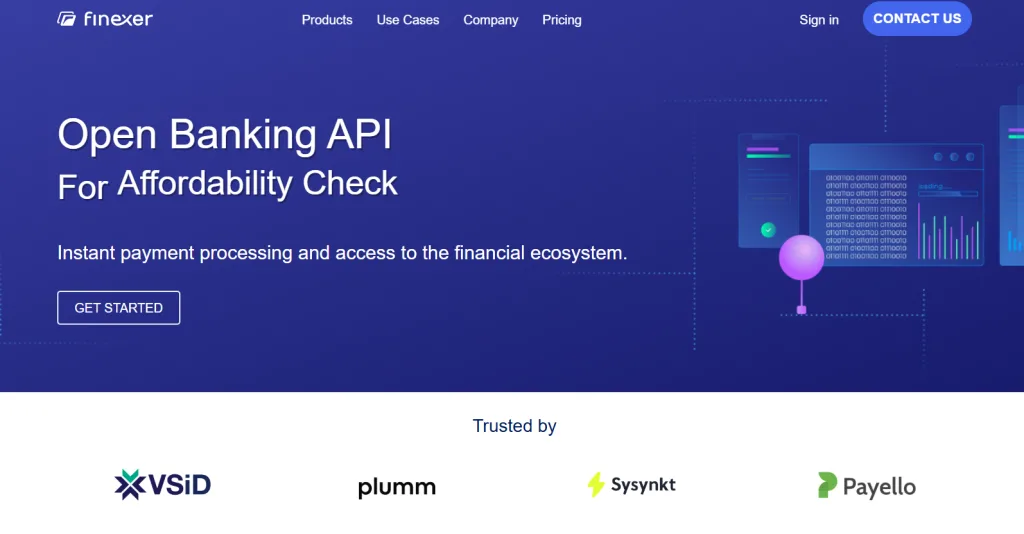
Finexer is an FCA-authorised TPP (Third-Party Provider) that gives UK firms secure access to bank data and instant payments through a single API. It’s built for accountants, law firms, and fintechs that want to automate financial checks and payments without managing complex integrations themselves.
What It Does
- Connects to 99% of UK banks.
- Enables businesses to collect verified account data in seconds.
- Supports Pay-by-Bank transfers and batch payment processing.
- Offers white-label APIs for firms that want a fully branded solution.
Real-World Impact
- VirtualSignature-ID uses Finexer’s bank-verified data to speed up identity checks and meet compliance standards.
- Sysynkt integrated Finexer’s APIs into its automation suite to simplify financial data collection for enterprise users.
Why It Works
As a UK-focused TPP, Finexer combines compliance, speed, and flexibility in one platform. Its usage-based pricing, FCA authorisation, and hands-on onboarding support make it easy for businesses to go live within weeks — not months.
Finexer shows how trusted third-party providers can make Open Banking simple and scalable bringing verified data, instant payments, and regulatory confidence together in one API.
2. TrueLayer
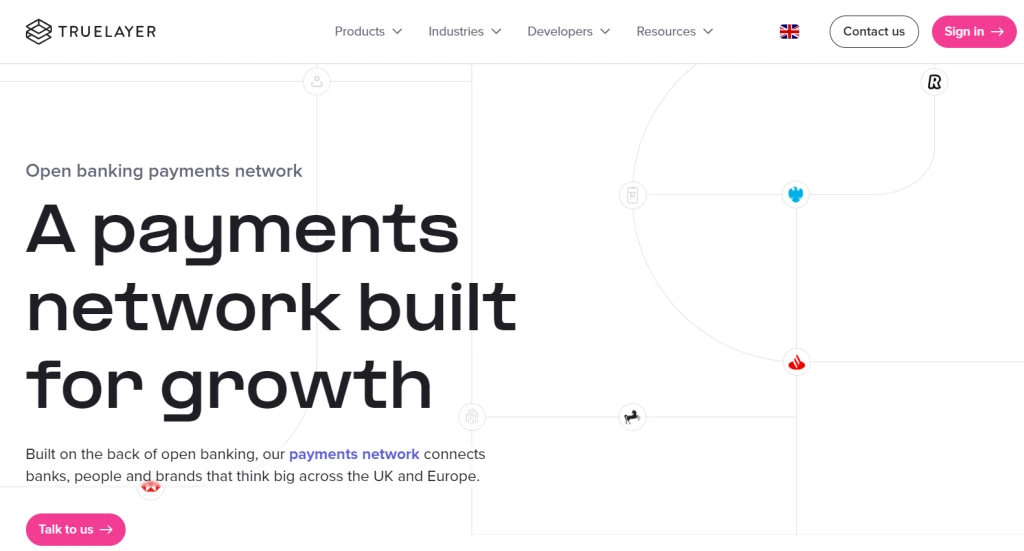
TrueLayer is one of the best-known platforms in the UK’s open banking ecosystem. It provides businesses with secure access to financial data and the ability to process instant account-to-account payments through its well-established API infrastructure.
What It Does
- Offers both account information and payment initiation capabilities.
- Connects to a wide network of UK and European banks through a single API.
- Supports developers with clear documentation, testing environments, and compliance resources.
Real-World Impact
TrueLayer’s technology powers a range of financial services from budgeting apps and lending platforms to online marketplaces. Its APIs have become a core component for businesses looking to improve customer experiences using verified financial data and faster payment methods.
Why It Works
The platform combines strong technical performance with regulatory compliance and a developer-friendly ecosystem, helping businesses adopt open banking capabilities without needing to build complex infrastructure from scratch.
3. Yapily
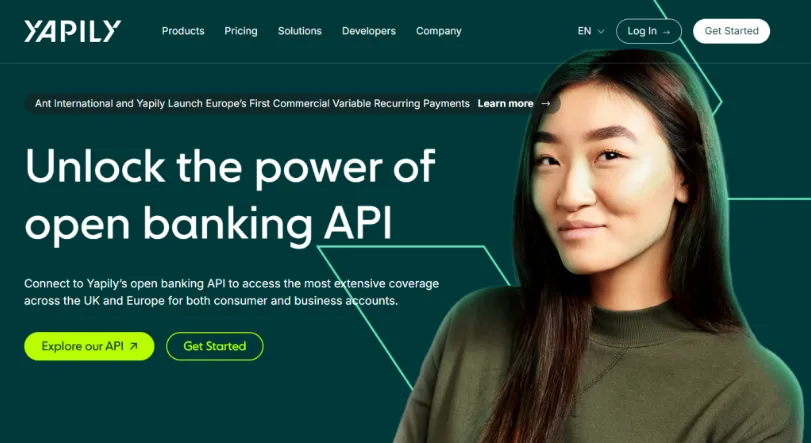
Yapily provides open banking connectivity for enterprises that need secure, high-volume access to financial data and payment initiation services. Its infrastructure is designed to handle complex integrations across multiple banks, making it a strong choice for financial institutions, lenders, and accounting platforms.
What It Does
- Delivers account information and payment initiation via a unified API.
- Offers extensive coverage across UK and European banks.
- Provides tools for bulk data retrieval and large-scale payment workflows.
Real-World Impact
Yapily’s technology supports various enterprise use cases from credit decisioning and payroll automation to cross-platform financial reconciliation. Its API framework allows larger firms to embed open banking functionality within their own systems without disrupting existing workflows.
Why It Works
The platform focuses on scalability and stability. Its ability to manage large data volumes and maintain consistent API performance has positioned Yapily as a trusted infrastructure partner for enterprise-grade financial applications.
4. Plaid
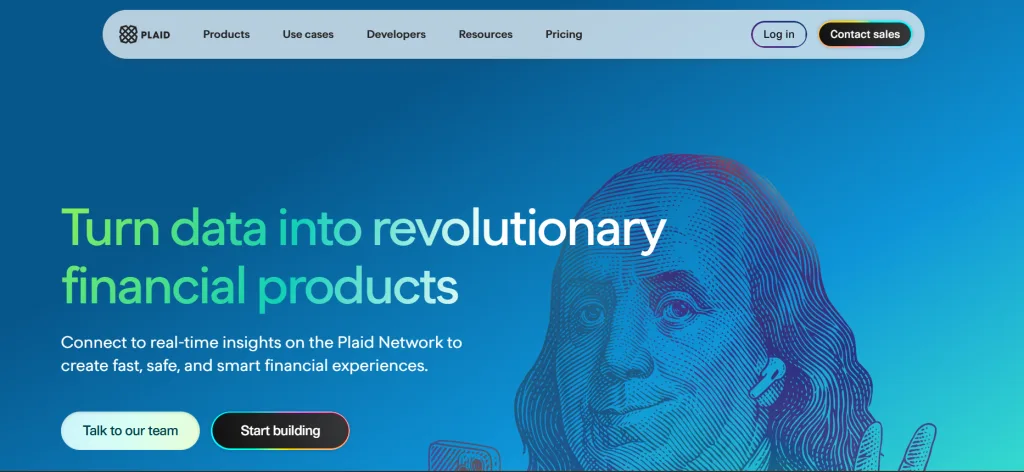
Plaid is a global data network that connects apps to users’ bank accounts, helping businesses access financial information securely and at scale. In the UK, it supports a wide range of fintech and financial service providers by offering reliable connectivity for data-driven use cases.
What It Does
- Provides APIs for account aggregation, identity verification, and income checks.
- Connects to major UK and EU banks under open banking regulations.
- Enables developers to build personalised financial experiences using verified data.
Real-World Impact
Plaid’s APIs are used in various applications from personal finance management and credit scoring to savings, investment, and lending tools. Businesses use Plaid’s infrastructure to make better data-based decisions and deliver more transparent financial services.
Why It Works
Its broad connectivity, focus on secure data exchange, and strong compliance standards have made Plaid a dependable choice for companies looking to integrate financial data across multiple regions.
5. Tink
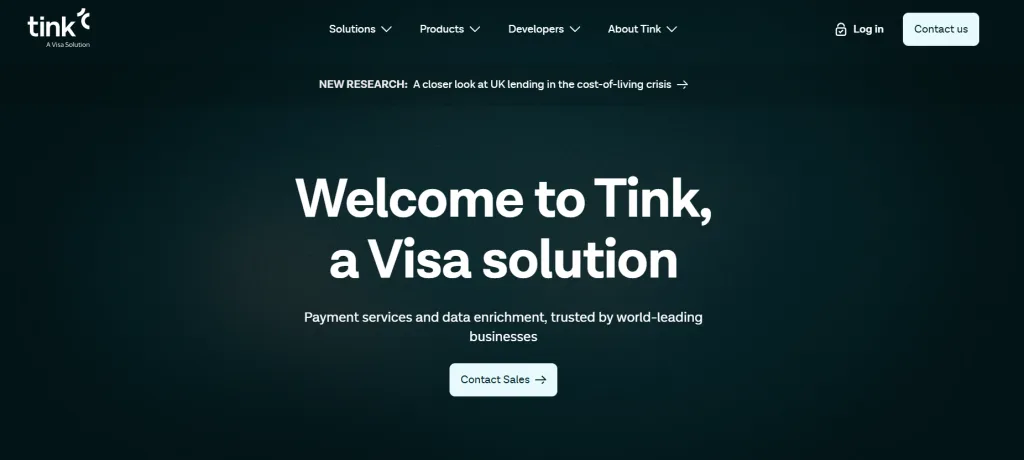
Tink is one of Europe’s most recognised third-party providers (TPPs), enabling businesses to securely access bank data and initiate payments through open banking APIs. With strong coverage across the UK and EU, Tink helps banks, fintechs, and merchants turn financial data into real-time insights and payment solutions.
What It Does
- Acts as a regulated TPP offering both Account Information and Payment Initiation services.
- Provides tools for data enrichment, helping firms categorise and analyse transactions automatically.
- Supports use cases such as lending, risk scoring, affordability checks, and instant Pay-by-Bank payments.
Real-World Impact
Tink’s infrastructure powers digital banking experiences, credit assessments, and merchant payment systems across multiple markets. By enabling secure, verified access to customer accounts, it helps businesses make faster and more informed financial decisions.
Why It Works
As a regulated TPP, Tink combines compliance strength with practical functionality offering robust APIs, high data accuracy, and consistent uptime. Its focus on enrichment and analytics has made it a reliable choice for organisations building open banking solutions that depend on clean, contextual financial data.
Conclusion
Open Banking in the UK has come a long way, and third-party providers are the reason it works so smoothly behind the scenes. They make it possible for businesses to access verified bank data, send payments instantly, and keep financial processes secure and compliant — all through simple APIs.
The companies featured here show how regulated TPPs are turning Open Banking from an idea into everyday business value. They’re helping firms spend less time on admin, make faster decisions, and serve customers better.
As adoption continues to grow, these providers will keep shaping how data and money move in the UK — quietly powering the next generation of finance, compliance, and customer experience.
How do TPPs benefit UK businesses?
TPPs help businesses save time and reduce costs by automating financial data collection, payments, and verification. They make processes like KYC, income checks, and Pay-by-Bank transactions faster and more secure.
What is a TPP in Open Banking?
A TPP (Third-Party Provider) is a regulated company authorised to access bank data or initiate payments on behalf of customers. In the UK, all TPPs must be registered with the FCA and follow Open Banking security standards.
What makes Finexer different from other TPPs?
Finexer focuses solely on the UK market. It offers usage-based pricing, no setup fees, and fully white-labelled APIs — making Open Banking integration faster, more flexible, and affordable for regulated businesses.
Automate payments and data collection in days, not months. Build on Finexer’s trusted Open banking platform
